
THE VOICE OF INTERNATIONAL LITHUANIA
|
VilNews has its own Google archive! Type a word in the above search box to find any article.
You can also follow us on Facebook. We have two different pages. Click to open and join.
|
Archive for June, 2011
Ferries to Klaipeda
- Posted by - (1) Comment
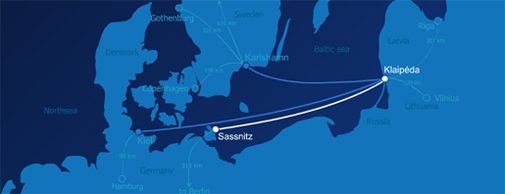
DFDS Seaways operate three passenger ferry routes on the Baltic Sea to/from the Lithuanian port city of Klaipeda.
1) The Klaipeda - Karlshamn ferry service connects Lithuania and Sweden with daily departures in each direction.
2) The Klaipeda - Kiel ferry service offers six departures in each direction per week connecting Lithuania with North-Western Germany & Southern Denmark.
3) The Klaipeda - Sassnitz service connects Lithuania to the East German island of Rügen from where there is quick access to the extensive German motorway network.
Check the DFDS web page for more information:
http://www.dfdslisco.lt/bookonline/?ln=en
- Bookmark :
- Digg
- del.icio.us
- Stumbleupon
- Redit it
“VilNews is changing the image of Lithuania!”
- Posted by - (0) Comment

Aage Myhre
Editor-in-Chief
The woman I talked to at the National Day reception at the Norwegian Embassy in Vilnius some days ago had much good to say about our VilNews e-magazine, and I will not hide that it is good to hear such words – that what we have tried to address and achieve understanding for, in and about this country, is so well received, perceived and understood by one of our readers.
It gives inspiration to continue and an even stronger belief in the power of a free, democratic and outspoken press.
Here is what she said:
"Your VilNews e-magazine contributes more to Lithuania’s international reputation than any political leader or advertising campaign has done over the latest twenty years!”
“The Soviet Union's attack on Lithuania in January 1991 led naturally to an enormous press coverage worldwide but the attention was soon gone and Lithuania did nothing to exploit the 'commercial value' of the great interest that the country was exposed to at the time. And since then, most of the international press coverage of Lithuania has been negative, marked by crimes carried out by individuals and gangs from here.”
“Then comes VilNews, and suddenly we have access to a unique publication that explains Lithuania to the world in a completely different and smart way that makes the country sound and look very interesting again. Even those times when you criticize various aspects one understands that the criticism is based on well founded thoughts, fairness and a balanced approach. You are simply changing the image and perception of Lithuania!”
"I am also very impressed with the unusual combination you present of news, blogs, comments, and the enormous background material - not least that of historical character. It’s also very good to see that so many of your readers actually write and communicate actively through the channel you offer them with VilNews. I've actually never seen anything like this anywhere in the world."
“I am now recommending VilNews to all my contacts around the world, and I wish this nation's leaders would study your publication very carefully and pay close attention to and follow up much of what you write and suggest."
- Bookmark :
- Digg
- del.icio.us
- Stumbleupon
- Redit it
- Posted by - (7) Comment
|
Cover of the book by Dr. Alfonsas Eidintas, “President of Lithuania: Prisoner of the gulag (A biography of Alexander Stulginskis).” Aleksandras Stulginskis, the first constitutional president after Lithuania had declared its renewed independence on 16 February 1918, was kidnapped at his home by Stalinist forces in June 1941 and deported to a Siberian Gulag. After he was released from the inhuman captivity, he was still for years forced to live in Siberia’s deep forests, until 1956.
Lithuania’s President Aleksandras Stulginskis built this Siberian log cabin by his How could it be that a former head of state of a free and independent country could be kidnapped in his own home and taken around half the globe to imprisonment in a labour camp where cruelty and inhumanity were the principal characteristics? How could it be that the rest of the world chose to ignore such an assault against a splendid leader who proudly had been fighting for democracy and independence in a nation that before the Second World War was fully on par with its neighbours in Scandinavia and Northern Europe, both economically and as an independent state? Just think of what would have been the reactions from the international community if one of the other state leaders from the 1920s had become victims of such a cruel abuse? I have below listed some of the state leaders who ruled at the time of President Stulginskis, many of them surely also knew him personally. Why didn’t his many 'friends' among leaders of all those nations around the world react and protest? One can perhaps understand that the war made it difficult to stand up and condemn the atrocities that happened in Stalin's mighty Soviet Union, but why were there no reactions after the war? In my opinion, President Stulginskis’ sad fate as a prisoner in Siberia through 15 long years, until 1956, is still too little known, and I think it’s high time we start spreading the story of Stulginskis throughout the world. Then his sufferings would not have been in vain, after all! The same applies for the 13 years he lived after he had come back to Lithuania, a period when the once proud president was subjected to increasingly humiliating abuse from the Lithuanian SSR.
Stulginskis passed away in Kaunas in 1969, after having experienced nearly 30 years of humiliating and unjust assaults in Siberia and in his once proud homeland Lithuania. It is today 92 years since Stulginskis, together with the other brave leaders of those days, became one of the signatories of Lithuania's declaration of independence. And in only 10 days it is exactly 125 years since this political lion was born (26 February 1885). President Aleksandras Stulginskis should not be forgotten. Aage Myhre
President
In May of 1920 Stulginskis was elected Chairman of the Constituent Seimas and Aleksandras Stulginskis was born in the village of Kutaliai of the Kaltinenai Rural District of the then Taurage District on 26 February 1885 into the family of a land tenant. He studied at the elementary school in Kaltinenai, the Liepaja gymnasium, and the Samogitian Theological Seminary in Kaunas. After graduating from the latter, he continued his studies in philosophy and theology at the University of Innsbruck (Austria). But upon making a decision not to be ordained as a priest, he entered the agronomy institute in Halle (Germany), and after graduating from it in 1913 started to work in Lithuania as an agronomist. He wrote many articles for the then Lithuanian press, mostly on the problems of the development of agriculture; from 1914 he edited the Viensedis (The Isolated Farm) periodical publication. When the Germans occupied Lithuania, he left for Vilnius and here joined the activity of Lithuanian organizations, and was elected to the Lithuanian Relief Committee, where he organized education courses for elementary school teachers. For quite a lengthy period headed the Rytas (Morning) Education Society, managed gardens in a Vilnius suburb that supplied orphanages with vegetables and potatoes. In 1918 he started publishing the newspaper Ukininkas (The Farmer), Ukininko kalendorius (The Farmer's Calendar).
In memory of the 40 years since Stulginskis’ passing away, 2009. Stulginskis was one of the founders of the Christian Democratic Party. In 1917 he was elected Chairman of the Central Committee of the Party. In 1917 together with other Lithuanian patriots he appealed with a memorandum to the President of the United States W. Wilson for the recognition of Lithuania's independence. He was one of the organizers of the Lithuanian conference of Vilnius, a participant In it, and was elected to the Council of Lithuania(later the State Council). On 16 February 1918 he signed the Independence Act. With the war nearing the end and with Lithuanian refugees returning from Russia, Stulginskis headed the state commission for their affairs. Stulginskis spoke for an independent, democratic Lithuania and criticized severely those who agreed for Lithuania to become a monarchic state. Stulginskis organized the defence of Lithuania against the Bolshevists and Poles, and founded a Lithuanian army. In M. Slezevicius' government he served as a minister without a portfolio. In P. Dovydaitis' cabinet of ministers A. Stulginskis served as a Deputy Prime Minister and Minister for Internal Affairs, afterwards Minister of Agriculture and State Wealth, and was one of the incorporators of the Ukio (Economic) Bank. In May of 1920 he was elected Chairman of the Constituent Seimas and President of the State, reelected President at the First (21 December 1922) and the Second (19 June 1923) Seimas, holding post of the President uninterruptedly until 7 June 1926, when Dr. Kazys Grinius was elected President. In 1925-1930 Stulginskis was in charge of the Lithuanian Scout Brotherhood.
Lithuania’s Presidential Palace in Kaunas (1920 – 1940) When the Bolsheviks occupied Vilnius in January 1919, the Government and ministries were moved to Kaunas. It was in the provisional capital that the State Council established the President's institution on 4 April 1919, and elected Antanas Smetona the first President of Lithuania. On 1 September 1919, President Smetona and his office moved to a building specially designated as the Presidential Palace, currently the Historical Presidential Palace in Kaunas. It was here President Stulginskis held office from 1922 till 1926. After the coup d'etat of 17 December 1926, Stulginskis was elected Chairman of the Fourth Seimas and held this post until 12 April 1927 when A. Smetona dissolved the Seimas. Then Stulginskis bought an estate in Jokubavas, in the Kretinga Rural District, and started to run it. At his leisure he wrote articles to the XX amzius (The 20th Century), Ukininkas and other periodical publications. In 1938 he took part in the first World Lithuanian Congress in Kaunas, where he delivered a speech demanding the observance of the democratic principles in Lithuania. The first year of the Soviet occupation he spent at his estate in Jokubavas. In June, 1941 he and his wife were arrested (their daughter Aldona evaded the arrest). The former President was deported to the camps in the Krasnoyarsk Territory, and his wife was exiled to the Komi Republic. Only in 1952, in the camp, Stulginskis' case was completed – and he was sentenced to the 25 years in Soviet camps. But after Stalin's death, due to Stulginskis' daring attempts he and his wife were allowed to return to Lithuania at the end of 1956. They resided in Kaunas. Lithuania’s highly respected pre-war president and democracy builder, Aleksandras Stulginskis passed away on 22 September 1969. He was buried in the Aukstoji Panemune cemetery In Kaunas. Grave of President Aleksandras Stulginskis and his wife Ona (Kaunas).
|
||||||||||||||||||||||||||
|
16 February – Lithuania’s Independence Day |
||||||||||||||||||||||||||
|
Members of the Council of Lithuania in 1917 From left to right Sitting: J. Vileišis, dr. J. Šaulys, kun. J. Staugaitis, St. Narutavičius, dr. J. Basanavičius, Standing: K. Bizauskas, J. Vailokaitis, Donatas Malinauskas, kun. Vl. Mironas, M. Biržiška, The Act of Independence of Lithuania (Lithuanian: Lietuvos Nepriklausomybės Aktas) or Act of February 16 was signed by theCouncil of Lithuania on February 16, 1918, proclaiming the restoration of an independent State of Lithuania, governed by democraticprinciples, with Vilnius as its capital. The Act was signed by all twenty representatives, chaired by Jonas Basanavičius. The Act of February 16 was the end result of a series of resolutions on the issue, including one issued by the Vilnius Conference and the Act of January 8. The path to the Act was long and complex because the German Empire exerted pressure on the Council to form an alliance. The Council had to carefully maneuver between the Germans, whose troops were present in Lithuania, and the demands of the Lithuanian people. The immediate effects of the announcement of Lithuania's re-establishment of independence were limited. Publication of the Act was prohibited by the German authorities, and the text was distributed and printed illegally. The work of the Council was hindered, and Germans remained in control over Lithuania. The situation changed only when Germany lost World War I in the fall of 1918. In November 1918 the first Cabinet of Lithuania was formed, and the Council of Lithuania gained control over the territory of Lithuania. Independent Lithuania, although it would soon be battling the Wars of Independence, became a reality. While the Act's original document has been lost, its legacy continues. The laconic Act is the legal basis for the existence of modern Lithuania, both during the interwar period and since 1990. The Act formulated the basic constitutional principles that were and still are followed by all Constitutions of Lithuania. The Act itself was a key element in the foundation of Lithuania's re-establishment of independence in 1990. Lithuania, breaking away from the Soviet Union, stressed that it was simply re-establishing the independent state that existed between the world wars and that the Act never lost its legal power. (Wikipedia)
|
||||||||||||||||||||||||||
- Bookmark :
- Digg
- del.icio.us
- Stumbleupon
- Redit it
The face of cruelty
- Posted by - (3) Comment
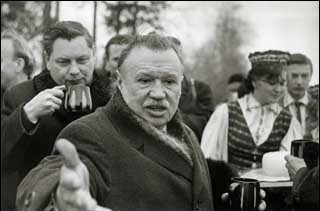
Antanas Sniečkus, leader of Lithuania’s Communist Party for the period 1940-1974 sent tens of thousands of his own countrymen to inhuman suffering and death in Siberian labour camps.
Antanas Sniečkus, the first secretary of the Communist Party of Lithuania (from 15 August 1940 until his death in 1974), is said to have been the initiator of the first mass deportations of Lithuanians in June 1941. He even had his own brother, with his family, deported to Siberia, where his brother died.
Antanas Sniečkus was born in 1903, in the village of Būbleliai, 60 km west of Kaunas. During the First World War, his family fled to Russia where he observed the Russian revolution of 1917. In 1919, his family returned to Lithuania; by 1920 he was already a member of the Bolshevik Party. In the same year, he was arrested for anti-governmental activities. He was released from prison on bail, but fled to Moscow, and became an agent of the Comintern. In Moscow, he earned the trust of Zigmas Angarietis, and Vincas Mickevičius-Kapsukas, and became a member of the Central Committee of the Communist Party of Lithuania. In 1926, the Comintern sent Sniečkus to Lithuania to replace the recently-executed Karolis Požėla as head of the banned and underground Communist Party of Lithuania.
From 1926 to 1930, he engaged in subversive activities in Lithuania, and was again arrested and imprisoned for them in the Kaunas Prison in 1930. In 1933, Sniečkus was released in exchange for Lithuanian political prisoners held in the USSR. In 1936, he returned to Lithuania. In 1939, he was arrested again, and sentenced to eight years in prison.
After the Soviets invaded and occupied Lithuania, Sniečkus was released from prison on 18 June 1940, and became the head of the Department of National Security. Foreign Affairs Commissar Vladimir Dekanozov, arrived in Lithuania a few days earlier on June 15, 1940, to organize the incorporation of Lithuania into the Soviet Union. As party secretary, Sniečkus issued Vladimir Dekanozov’s orders in the party’s name.
Sniečkus helped create an atmosphere of terror prior to the elections of the newly established, by the Soviet authorities, People's Seimas in July 1940. Only the Communist Party of Lithuania and its collaborators could nominate candidates. People were threatened in various ways to participate in the elections, but the results were falsified anyway. 21 July 1940 the People's Parliament, declared that the Lithuanian "people" wanted to join the Soviet Union, and 3 August 3 1940, the Supreme Soviet of the USSR incorporated Lithuania into the Soviet Union.
The process of annexation was formally over and the Lithuanian Soviet Socialist Republic was created. From 15 August 1940, until his death in 1974, Sniečkus remained the First Secretary of the Lithuanian Communist Party.
34 years of terror and atrocities against his own people had finally come to an end.
- Bookmark :
- Digg
- del.icio.us
- Stumbleupon
- Redit it
The significance of 14 June 1941
- Posted by - (2) Comment

Every year, around 14th June, Baltic communities all over the world commemorate the mass-deportations from their homelands by USSR occupying forces, to the Siberian gulags during and after WWII.
In June 1940 Estonia, Latvia and Lithuania were occupied by Soviet Russia. One year later, on the fatal night of 14 June 1941, at least 60,000 people from those three countries were deported at a single stroke to the remote Siberian regions of the former USSR. Some 27.000 Lithuanians were arrested and deported during the week of 14 and 20 June 1941, before the Soviet-German war broke out 22 June 1941.
The deportations of 14 June 1941 were acts of macabre political violence never before experienced by the Baltic people. The vivid memory of that day has remained indelible in the minds of Estonians, Latvians and Lithuanians.
The fate of the Baltic States was decided by the so-called Molotov-Ribbentrop Pact of August 1939 between Nazi Germany and the Union of Soviet Socialist Republics (see below article). A secret protocol to this treaty assigned Finland, Estonia, Latvia and eastern Poland to the Soviet orbit.
In June 1940 a Soviet ultimatum demanded new Baltic governments "able and willing to secure the honest application of the Soviet-Baltic mutual assistance treaty". The following days Soviet forces occupied the whole region.
People of all social strata and nationality were deported, and it is hard to speculate about the general principle underlying these deportations. The victims were generally those regarded as 'socially harmful or undesirable.' For several months preceding the deportations, the NKVD (later renamed to KGB) employees were engaged in composing the lists of people to be deported. Later, it became clear that these lists were composed haphazardly and were based on apparently unconfirmed denunciations.
The deportation process often started with an NKVD truck approaching the house where the target family lived. Two of the three NKVD men in the truck entered the house and told the victims to pack up. Some people got twenty minutes to pack, others, an entire day. The manner was rude, the soldiers did not give any consideration to age or illness. There were cases when persons to be deported were carried into the truck on a stretcher. Then the load of deportees was taken to cattle wagons which were already waiting for them on a side track of the railway station.
The Soviet culture of violence exploded when Nazi troops crossed into Lithuania 22 June 1941. As Soviet authorities fled, some local communist officials summarily executed prisoners whom they could not take along. In turn Lithuanians rose in revolt and attacked the retreating Red Army.
Urged on by Nazi propaganda that identified Jews with communism, some joined the Nazi authorities and turned on the Jewish population of the republic. During WWII, an estimated 90-95 percent of Lithuania’s some 250.000 Jews were killed.
When the Red Army returned to Lithuania in 1944, it found a different mood and even a different population than it had faced in 1940. In the cities, the historic Jewish communities barely existed; many urban Lithuanians had fled to seek refuge in the West as “Displaced Persons.”
In the countryside, partisan groups offered fierce armed resistance to Soviet rule, through a guerilla war referred to as the longest and bloodiest in modern European history, killing more than 20.000 Lithuanians and 70.000 Soviet soldiers during the period 1944-1953.
- Bookmark :
- Digg
- del.icio.us
- Stumbleupon
- Redit it
Best-selling author Ruta Sepetys interviewed by Ellen Cassedy

Ruta Sepetys’ novel “Between shades of Gray” tells the story of the Soviet deportations of 1941. More at www.betweenshadesofgray.com
June 14 marks the 70th anniversary of mass deportation of Lithuanians to Siberia. On this date in 1941, as Nazi Germany prepared to invade Lithuania, Soviet authorities loaded tens of thousands of people – men, women and children – into cattle cars and transported them into exile. Some were sentenced to death; some died under harsh conditions of forced labor; some survived. With Stalin’s death in 1953, the Siberian camps began to empty out. But it was many years before the stories of the exile were openly told.

Author Ruta Sepetys
A new novel, Between Shades of Gray (Philomel/Penguin), brings the story of the 1941 deportations into vivid focus. It will be published in Lithuania under the name Tarp pilku debesu (Alma Littera), and in 23 other countries.
VilNews correspondent Ellen Cassedy interviewed author Ruta Sepetys Washington, D.C.
Growing up in America as the daughter of a Lithuanian refugee, you didn’t know that members of your own extended family were among the deported. How did you find out?
I visited Lithuania several years ago and met with some family members for the first time. They told me that after my grandfather left Lithuania in 1940 with his wife and son (my father), officials came looking for him. When they couldn’t find him, they deported other members of the family.
And once you learned what had happened…
I became passionate about telling the story. I went back to Lithuania and met with survivors, psychologists, historians, and government officials. Everyone I met had a connection to Siberia.
As a member of the second generation after the deportations, did you feel you had a special role to play?
Yes. I asked questions that the previous generation might find inappropriate. I wanted to get at the truth. I wanted to know.
Were these events difficult for people to talk about?
Sometimes, yes. At first I thought I would write the story as non-fiction, but people’s hands were trembling as they talked to me. “You can’t use my name,” they said. They wanted to talk, but not on the record. I wanted the story to be personal. I wanted characters that readers could root for, cry for. So I created Lina, the 15-year-old heroine of the book.
As the book opens, Lina is a lively teenage girl looking forward to summer vacation. Then the secret police arrive to take her and her mother and brother to Siberia. Lina’s efforts to survive in both body and soul make for a harrowing tale, but also, I found, an uplifting one.
What struck you about the survivors you met?
Their capacity for forgiveness. It seemed that those who suffered the worst found the most forgiveness. It was such a gift to meet with these people.
What does the title mean?
Over and over, survivors told me that what they went through was complex, not black and white. Not all of the NKVD officers were bad, for example. Some helped the prisoners with small acts of kindness, which made them feel human again and gave them strength.
Your book is winning great acclaim. You’re making two European tours. Why do you think people are open to hearing this story now, when in the past they might not have been?
People gravitate toward stories about the human spirit, about characters who are beautiful in their imperfection. Maybe people find something of themselves in these characters.
I hope we can use this story to study a tragic part of history and create more protection for the Baltics. Examining history creates hope for a more just future.
My own Jewish family suffered from the crimes of the Nazi era in Lithuania. How do you think the two eras should be examined today?
I think the crimes of Hitler and the crimes of Stalin should be studied and acknowledged separately, but I hope people will be open to conversations where both parts of history are examined and discussed respectfully. I hope we can celebrate our braveries and console our regrets together.
Last words?
For many years, Lithuania tried to get this story out there in the world, but our story was lost.
I wrote the book, but it’s not my story. The story belongs to Lithuania and the Baltics. I’m honored to tell it.
Read more about Between Shades of Gray at www.betweenshadesofgray.com.
 |
Ellen Cassedy |
- Bookmark :
- Digg
- del.icio.us
- Stumbleupon
- Redit it
The Molotov – Ribbentrop Pact
- Posted by - (1) Comment
|
Part 1 of 2: |
THE MOLOTOV - RIBBENTROP PACT: THE DOCUMENTS
Dear Readers,
In this part 1 of 2 articles about the Molotov – Ribbentrop Pact and the Secret Protocols, you will get some insight as to when and why the Pact and Secret Protocols were made public and the work that has done to verify to authenticity of the copies of the documents now available.
INTRODUCTION by EDITOR SAULIUS SUŽIEDĖLIS
The day after the signing of the German-Soviet Nonaggression Pact of 23 August 1939, Soviet and German newspapers carried the news and text of the treaty to a stunned Europe. However, from the very beginning there was well-founded suspicion that the Pact contained more than met the eye. According to Richard Maasing, an officer in the Estonian general staff, the Estonian military had realized by 26 August that the Pact divided the Baltic States into German and Soviet spheres of interest and that Estonia had been assigned to the latter. It seems that the Latvian diplomatic service also learned of the contents of the Pact soon after the signing and that rumors about Germany turning over Latvia to Russia proliferated. Thus, while the exact contents of the secret protocol of 23 August and the subsequent secret arrangements of 28 September 1939 were unknown to the governments of the Baltic states, and knowledge of the texts was restricted to a small number of German and Soviet officials, the general outline of the agreements on "spheres of influence" was either known or strongly suspected very soon after they were concluded.
Moreover, despite the provisions on strict secrecy, Stalin and Molotov leaked the fact of their secret agreement with the Germans on the spheres of influence during negotiations with Baltic leaders in Moscow as part of the Soviet strategy of pressuring the Baltic governments into accepting the mutual defense pacts with the USSR. This is confirmed by a number of different sources, including the Lithuanian Foreign Minister Juozas Urbšys and Gen. Stasys Raštikis, the Commander of the Lithuanian Armed Forces during the negotiations in Moscow in early October 1939. The Soviets informed the Germans of their indiscretion; the leaks to the Baltic ministers irritated the Germans who clumsily attempted to diminish the importance of the secret Pact provisions in their replies to the astonished and perturbed Baltic representatives. It is inconceivable that news of the German-Soviet horsetrading concerning the Baltic States did not subsequently come to the attention of the Western powers.
The exact details of the secret territorial provisions of the German-Soviet Nonaggression Pact of 23 August 1939, the German-Soviet Boundaries and Friendship Treaty of 28 September, and the Secret Protocol of 10 January 1941 (concerning the so-called Suwalki Strip), were unknown until the appearance of copies of the secret protocols in the West after the Second World War. It came to the public's attention for the first time as a defense document in the Nuremberg Trials in 1946 and has since been quoted in numerous publications. The description of the secret protocol of 23 August 1939 in the Estonian-language CP daily Rahva Haal of 10 August 1988 (published a week later in Sovetskaya Estoniya) suggested that the original is held by the Foreign Ministry Archive of the German Federal Republic in Bonn. For his part, Valentin Falin, then head of TASS, reiterated at a Moscow press conference that no original of the secret protocol has ever been found.
In a strictly technical sense, Mr. Falin was right. According to American scholars who worked on the mammoth project of classifying and filming captured German records after the war, the originals of many of the most important documents of the Reich's Foreign Office (Auswaertigen Amt) were, in fact, never found. In 1943, as the archives of the German Foreign Office were being evacuated from Berlin because of the Allied air attacks, Reich Foreign Minister Joachim von Ribbentrop ordered the filming of the most important papers. The work was carried out by Paul Otto Schmidt, the chief interpreter of the Reich Foreign Office. Karl von Loesch, Schmidt's assistant, placed the films into boxes and buried them. Thus, these films survived the destruction of many important Foreign Office records carried out by the Nazis themselves at the close of the war. In late May 1945 Loesch met Lt. Col. R.C. Thomson, chief of the British documents team, and the so-called Loesch films became part of the Captured German Records project. The German-Russian treaties of 23 August 1939 and 28 September 1939, together with their secret protocols, were found in the films of Ribbentrop's working files. (These are contained in part of the series F1-F19 in the German Foreign Office collections).
Over the years, some East Bloc officials and scholars have either ignored the secret protocols of the German-Soviet treaties, or have presented them as Western forgeries. There are a number of reasons and circumstances that virtually eliminate the possibility that the secret protocols are fakes. As mentioned above, the existence of the protocols was revealed to Baltic statesmen in the autumn of 1939. The Germans, when confronted by indications that territorial arrangements had been worked out between the Reich and the Soviet Union, did not actually deny the existence of such agreements at the time. The behavior of both the Soviet and German governments during 1939-1941 indicates a basic understanding of each other's territorial prerogatives in Eastern Europe.
Of course, circumstantial evidence of the existence of an agreement does not address the possibility that understandings different from those described in the secret protocols had been undertaken. However, in addition to forensic testing of an actual original or authentic carbon copy, there are other ways of ascertaining the authenticity of a historic document. As medieval and early modern specialists know, few important historical documents have survived in the original. Often we deal with copies of copies made at a later date; sometimes, documents are excerpted in commentaries, that is, secondary works, and other texts written many years after the fact. In other words, we often learn about texts from references to them in other texts. Naturally, the situation is much better for the nineteenth and twentieth centuries. Yet any overview of references to the Molotov-Ribbentrop Pact contained in captured German correspondence makes the theory of a forgery extremely unlikely if downright impossible.
The number of references, partial quotes from, and allusions to the secret protocols in the available collections of diplomatic documents after the war is quite impressive. The various references can be grouped as follows:
(a) the preliminary diplomatic exchanges in July and August 1939 concerning German and Soviet diplomats;
(b) the correspondence between 23 August and the end of October 1939;
(c) the exchanges of views concerning the territorial changes of summer 1940 ending with Molotov's visit to Berlin in November 1940;
(d) the final period before the German attack on the Soviet Union, November 1940-June 1941. The evidence for the authenticity of the secret protocols is overwhelming, even if we ignored the memoir literature of the participants themselves.
The way in which the details of the various exchanges of correspondence concerning Poland, the Baltic States and Bessarabia, the territories explicitly named in the German-Soviet correspondence, dovetail with the provisions of the secret protocols, as well as with actual German and Soviet diplomacy, is striking. Any assumption that the secret protocols were a creation would lead to the conclusion that the hundreds of documents which refer to and quote the protocols would also have to be forgeries. That someone could succeed in such a task strains credibility. No forgerer will go out of his way to make a task unnecessarily complicated by increasing the number of factual variables, thus risking exposure. Certainly any creator of these numerous "supporting" documents would have to be aware of the probability that Soviet archives would contain records conflicting with the accounts of events contained in supposedly forged correspondence of the German Foreign Office.
It is important to remember that there is an immense difference between (a) documenting a nonexistent event or communication for propaganda purposes, a well-known disinformation stratagem, and (b) structuring a forged document, which distorts an otherwise real event in the more distant past, involving real personalities interacting within a complex bureaucracy. The first type of fabrication is relatively simple and risk-free; it normally requires the creation of only a single document and is a "one-shot" operation. From the forgerer's point of view, the fictitious event cannot be, and need not be, proven or disproven. It can always be affirmed as long as there are those willing to believe the lie.
However, the second type of creation is enormously difficult and, in fact, quite risky for the forger. The danger of discovery is particularly acute if the event in question, such as the negotiation and conclusion of the German-Soviet Nonaggression Pact, is some distance in the past and well-documented by voluminous primary sources. Physical expertise in document creation is of limited help here. Total control over all sources of documentation of the broader historical event in question is the only way to assure success in fabrication. Everything must fit perfectly; every additional fiction necessary to construct the lie considerably increases the number of variables to be taken into account and compounds the risk of detection. The fabricated structure must correspond exactly to the past, both the known and the yet-to-be-discovered. It must fit precisely within the continuum of historical time. The enterprise requires a domination of the past and present as thorough as that envisioned in Orwell's 1984. In real life, particularly in situations where documentation is abundant and scattered among different jurisdictions, this sort of total control over the sources is virtually impossible to achieve.
The fact is that none of the numerous supporting documents which confirm the existence of the secret protocols has been seriously questioned by competent scholars in the West. There seems little reason to doubt the authenticity of the texts of the secret protocols that partitioned Eastern Europe between Germany and the Soviet Union in 1939. However, even the hint of doubt could finally be laid to rest should the Soviet Union provide access to its archives on the 1939-1941 period for credible and independent scholars. There would be no lack of expert help in finding the important documents assuming they are still extant. As one of Lithuania's leading and most popular poets, Justinas Marcinkevičius, told the 23 August 1988 demonstration in Vilnius on the anniversary of the Molotov-Ribbentrop pact:
-----------------------------------------------------------------------------------------------------------------------------
And so, these days Moscow's scholars have once again announced in the press that they still cannot, are unable, to find these (secret) protocols in Soviet archives. This is a joke, nothing else. It is entirely clear that Moscow does not locate that which it does not want to find, that which is unnecessary to find. One can search, but one doesn't need to find. I say, perhaps, Baltic historians and archivists could help them (in Moscow). This would truly constitute unselfish fraternal assistance for the sake of historical truth.
-----------------------------------------------------------------------------------------------------------------------------
In part 2 of 2 of this series you will see the microfilm copies of the German-Soviet pacts housed in the National Archives in Washington, D.C. and the German and Russian-language facsimiles of the German-Soviet Nonaggression Pact of 23 August 1939 and the Secret Supplementary Protocol.
We would like to thank Lituanus for their kind permission to share this article with you.
LITUANUS
LITHUANIAN QUARTERLY JOURNAL OF ARTS AND SCIENCES
Volume 35 - Spring 1989
Editor of this issue: Saulius Sužiedėlis
THE MOLOTOV - RIBBENTROP PACT: THE DOCUMENTS
http://www.lituanus.org
- Bookmark :
- Digg
- del.icio.us
- Stumbleupon
- Redit it
Lithuania’s president Aleksandras Stulginskis was among those arrested and deported to Siberia in June 1941
- Posted by - (2) Comment
![]()

Cover of the book by Dr. Alfonsas Eidintas,
“President of Lithuania: Prisoner of the gulag (A biography of Aleksandras Stulginskis).”
Aleksandras Stulginskis, the first constitutional president after Lithuania had declared its renewed independence on 16 February 1918, was kidnapped at his home by Stalinist forces in June 1941 and deported to a Siberian Gulag. After he was released from the inhuman captivity, he was still for years forced to live in Siberia's deep forests, until 1956. There, he built this log-cabin, which then for many years was home to Lithuania's former president and his wife Ona.

Lithuania’s President Aleksandras Stulginskis built this Siberian log cabin
by his own hands, living here with his wife Ona until 1956.
- Bookmark :
- Digg
- del.icio.us
- Stumbleupon
- Redit it
Members of the European Parliament commemorate the 1941 deportations from the Baltic States
- Posted by - (0) Comment

Latvian MEP Roberts Zile urges the European Commission to carry out investigations into the deportations of Balts by the USSR during and after WWII
Members of the European Parliament commemorated the 1941 deportations from the Baltic States during a statement from president European Parliament President Jerzy Buzek on 6 June 2011.
14 June marks the 70th anniversary of the mass deportation of thousands of people who were exiled to Siberia during Soviet rule.
More than 30,000 people from Estonia, Latvia and Lithuania were sent to prison camps under the orders of Joseph Stalin.
Tunne Kelam, an Estonian MEP, highlighted the deep psychological trauma experienced by the victims, while Latvian MEP Roberts Zile urged the European Commission to carry out an investigation into the deportations.
The Baltic republics regained their independence from the Soviet Union 20 years ago and joined the European Union in May 2004.
- Bookmark :
- Digg
- del.icio.us
- Stumbleupon
- Redit it
Lithuania to raise pension age to 65 by 2026
- Posted by - (0) Comment
![]()

Lithuanian lawmakers have decided to gradually raise the pension age to 65 to improve the country's public finances.
The Lithuanian parliament approved the plan Thursday in a 60-42 vote, where 12 lawmakers abstained from voting.
The current age for retirement is 60 for women and 62 and a half for men. The new plan means the pension age will be raised by two months a year for men and four months a year for women to reach 65 for both by 2026.
The decision follows similar moves across Europe, where countries have been forced to cut spending to bring down public debt.
Source:
http://www.businessweek.com/
- Bookmark :
- Digg
- del.icio.us
- Stumbleupon
- Redit it
- Posted by - (0) Comment
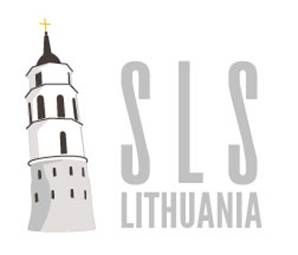 The global organization “Summer Literary Seminars (SLS)” is coming to Lithuania this summer!
The global organization “Summer Literary Seminars (SLS)” is coming to Lithuania this summer!
SLS Lithuania 2011 will take place in Vilnius, a welcoming European capital with a rich and diverse linguistic and literary heritage. The city has produced, or been haven and home to, some of the major figures of Lithuanian, Slavic, and Yiddish literature.
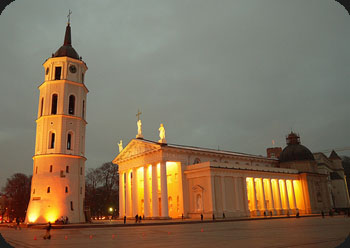 Vilnius is the perfect backdrop for a literary seminar. As a cultural crossroads over the centuries it has a rich and multi-layered past, which is reflected in the city’s varied architecture and intriguing residents. More importantly for SLS, Vilnius is not a city-museum but a city with a bright future and a rich, if at times troubled, past. From a purely practical vantage point, it's compact and walkable, and it offers all of the conveniences of a global city, albeit with its own idiosyncratic twists. An inspiration for any artist.
Vilnius is the perfect backdrop for a literary seminar. As a cultural crossroads over the centuries it has a rich and multi-layered past, which is reflected in the city’s varied architecture and intriguing residents. More importantly for SLS, Vilnius is not a city-museum but a city with a bright future and a rich, if at times troubled, past. From a purely practical vantage point, it's compact and walkable, and it offers all of the conveniences of a global city, albeit with its own idiosyncratic twists. An inspiration for any artist.
In addition to intensive daytime workshops taught by leading North American writers, participants in this unique two-week seminar will get a creative charge from the engagement with this refreshing and vibrant cultural milieu.
SLS offers much more than a mere change of scenery. Participants and faculty spend more time together outside of the classroom than in most summer literary programs.
In Lithuania, participants will also get to meet and socialize with fringe and mainstream artists from a different culture. And they get first-hand exposure to a lifestyle in flux -- one melding the absurdities of the Soviet past, the contradictions of the (East) European present, and the strivings of a feisty, innovative little land on the coast of the Baltic Sea.
Also, for its edition, SLS Lithuania will join in celebrations marking the centenary of the birth of the poet and 1980 Nobel laureate Czeslaw Milosz, who lived and studied in Vilnius before World War Two. He eventually settled in the United States and lectured at U.C. Berkeley for many years. SLS has invited faculty who were friends of this giant of twentieth century literature during his American years to join us in Vilnius.
In partnership with the Litvak Studies Institute, SLS will reprise the fascinating ‘Jewish Lithuania’ stream. The program is an intensive two-week exploration of Vilnius's (or if you prefer, Vilne's) rich Jewish past.
Summers are short in this corner of Northern Europe, which is why street life in Vilnius is lived to the hilt in August, when the days are long and the nights are short. Outdoor cafes, cozy courtyard bistros and cool cellar taprooms abound in Old Town -- prices are dramatically lower than in the big tourism hubs. And there are more winding streets, cobblestones, archways, bell towers, bridges, spires, steeples, and leafy parks with ancient oaks in Vilnius than you can aim a camera at. Come join us for the experience of a lifetime, a literary journey like no other.
Please feel free to direct any questions you may have to: info@litvakstudiesinstitute.org.
Seminars
Morning Seminars
Fiction – Joseph Kertes
Poetry – Edward Hirsch
Mixed Genre – Robin Hemley
Poetry & Translation – Kerry Shawn Keys
Afternoon Seminars
Fiction – Josip Novakovich
Poetry – Rebecca Seiferle
Laimis Briedis – “Vilnius: City of Strangers” Walking Tour
Jewish Lithuania:Litvak Experiences Option
SLS Lithuania June 31 - August 13, 2011
Click here for more information on SLS Lithuania
- Bookmark :
- Digg
- del.icio.us
- Stumbleupon
- Redit it
DnB NORD allows criminals to use the bank
- Posted by - (1) Comment
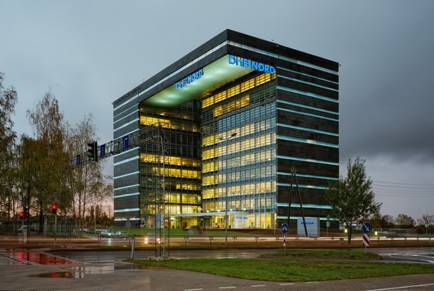
A new research study notes that only a small number of banks are willing to knowingly process what the industry calls "high-risk" transactions. In fact, just three banks, Azerigazbank in Azerbaijan, DnB NORD in Latvia and St.Kitts-Nevis-Anguilla National Bank in the Caribbean, provided the payment servicing for over 95 percent of the spam-advertised goods in the study. Norwegian DnB Nor owns the subsidiary DnB NORD bank in the Baltic States.
“Want to stop junk email? Block payments to spammers,” a new study tells. Researchers who have examined spam supply chains, find cutting off payments is the most effective way to stop influx of nuisance emails
Every day, people buy goods via automatic generated junk mails that offer cheap viagra pills, copies of art works, software, fashion clothing, medicine, fake handbags and everything else of illegal goods that can be obtained via the Internet. And people are buying lots of illegal and pirated goods, through criminal systems that have become a billion dollar industry.
In a new report by 15 scientists at Berkeley, San Diego International Computer Science Institute and the Budapest University of Technology and Economics appointed three banks as the main culprits.
The research notes that only a small number of banks are willing to knowingly process what the industry calls "high-risk" transactions. In fact, just three banks, Azerigazbank in Azerbaijan, DnB NORD in Latvia and St.Kitts-Nevis-Anguilla National Bank in the Caribbean, provided the payment servicing for over 95 percent of the spam-advertised goods in the study. Norwegian DnB Nor owns the subsidiary DnB NORD bank in the Baltic States.
The researchers even went as far as to purchase spam-advertised goods in order to find out who the payment processors are. Finding a way to stifle the operations of a payment processor would be a much more disruptive action than domain blocking, the researchers note.
"It is the banking component of the spam value chain that is both the least studied and, we believe, the most critical," researchers state in the paper. "Without an effective mechanism to transfer consumer payments, it would be difficult to finance the rest of the spam ecosystem."
"The replacement cost for new banks is high, both in setup fees and more importantly in time and overhead," the paper states. "Acquiring a legitimate merchant account directly with a bank requires coordination with the bank, with the card association, with a payment processor and typically involves a great deal of due diligence and delay.
The onus to stop payments would ultimately be on Western banks, the researchers conclude.
"If the U.S. issuing banks (i.e. banks that provide credit cards to U.S. consumers) refused to settle certain transactions (e.g., card-not-present transactions for a subset of Merchant Category Codes) with the banks identified as supporting spam-advertised goods, then the underlying enterprise would be dramatically demonetized. Furthermore, it appears plausible that such a "financial blacklist" could be updated very quickly (driven by modest numbers of undercover buys, as in our study) and far more rapidly than the turn-around time to acquire new banking resources - a rare asymmetry favouring the anti-spam community."
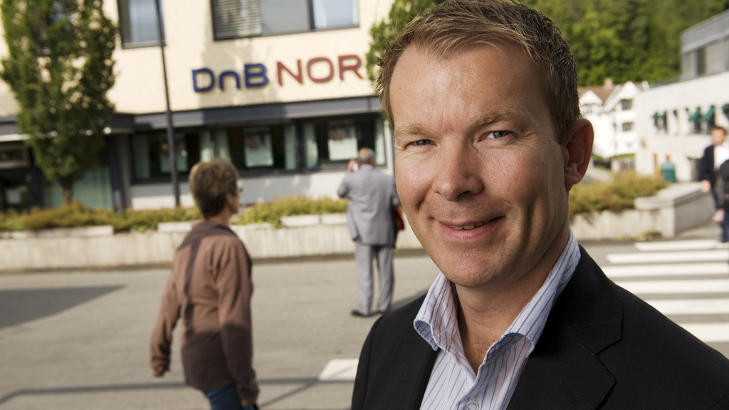
Information Director of DnB Nor, Thomas Midteide, admits to Norwegian DAGBLADET that DnB NORD has had problems with spam-customers. Photo: DNB NOR
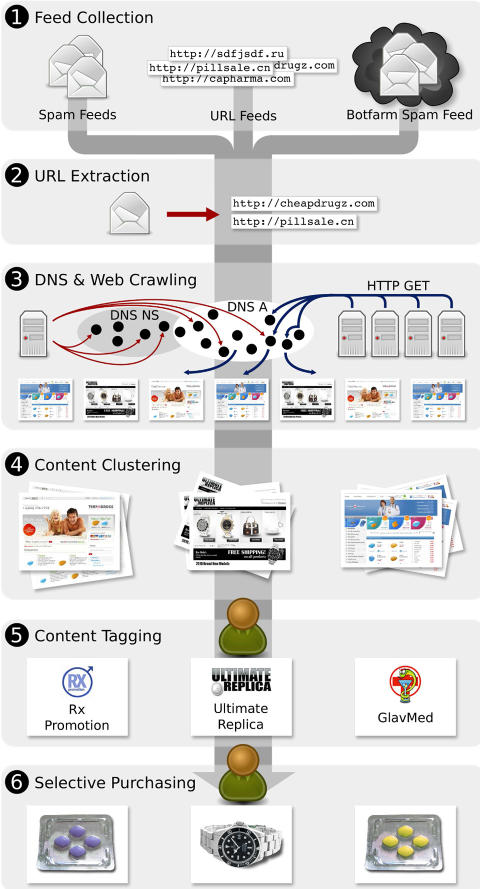
In the work, the scientists followed the money, receiving spam from around theworld, making over 100 purchases for three months and found that three banks account for 95 percent of all waste transactions.
Illustration from the report.
Has thrown out spam customer
- This is as far as I know a group of students who completed about 70 transactions, and so on which banks were clearing bank. One of the banks that came up was thus DnB Nord, "says information officer of DnB Nor in Oslo, Thomas Midteide, to Dagbladet.
He admits that DnB NORD has had problems with spam-customers.
- We took over the Latvian bank in the New Year. They previously had a customer who had his share of the cash flow from the spam-related activities. This customer was terminated before we took over the bank, and is therefore not a customer of the bank anymore, "Midteide. He says that the exchange amount that went through this account was not big.
- Spam is a big problem for everyone using electronic channels, and we in the banks must also do our part to prevent this type of activity, "says Midteide to the newspaper.
China, India, USA and New Zealand
All booking software and 85 percent of medication orders used the correct Visa category code that identifies what is sold. The reason for this is that they can get huge fines from Visa when they put the wrong code to hide the fact that they are selling risk goods.
The sale was completed by 13 providers in four countries: USA, India, China and New Zealand. Most of the drugs came from India, most herbal products came from the U.S., probably because of weak regulation of this market in the U.S.
In order to stop selling fake goods researchers suggest that the attack on the infrastructure for payment. The options are few and switching infrastructure costs a lot. They suggest that the U.S. stock rules that make it illegal to carry out transactions for known sellers. They write that it is not working very helpful to keep track of suppliers of illegal goods.
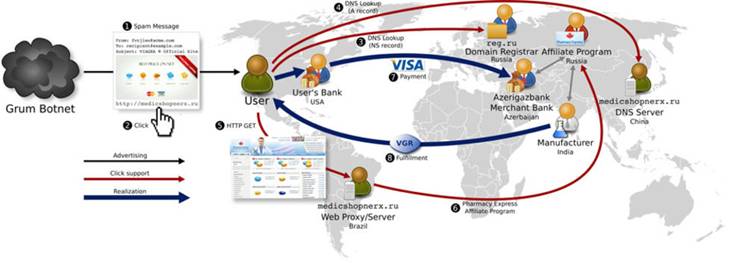
The infrastructure of a single chain URLs in the spam world.
Illustration from the report.
- Bookmark :
- Digg
- del.icio.us
- Stumbleupon
- Redit it
Kubilius still wants Euro introduced by 2014
- Posted by - (0) Comment
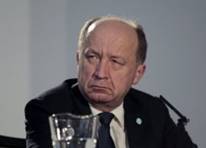
Prime Minister Andrius Kubilius says that Lithuania will press ahead with a plan to adopt the euro in 2014 and accompanying fiscal reforms
Lithuania’s central bank governor Vitas Vasiliauskas said the country was unlikely to hit that target due to price pressures, setting the scene for above-target inflation to thwart its ambition of joining the single currency for the second time.
Analysts agreed it would be no surprise if Lithuania missed the target, but Prime Minister Andrius Kubilius said his government would not waver from its accession programme.
"The government is aware of the inflation challenge, but is going to stick to its plan to meet the euro adoption criteria by the end of 2012, including budget deficit," Kubilius told Reuters via his spokesman.
Lithuania missed euro adoption in 2007 after inflation overshot the entry criterion, as stipulated by the Maastricht Treaty, by a whisker.
Data earlier on Wednesday showed consumer prices rose at their fastest rate in two years in May.
"Inflation is going to be the main obstacle (again)," said Vasiliauskas, citing high energy prices and becoming the first top official to say the entry timetable was unrealistic.
"Our forecasts show that we will not be able to meet the (entry) criteria in 2012 or in 2013...
"The fact is that under our forecasts, 2014 does not look like the year when we can have the euro ...," he told a news conference.
The central bank expects inflation to rise to 3.9 percent in 2012 from 3.8 percent this year.
Read more at:
http://www.reuters.com/article/2011/06/08/lithuania-euro-idUSLDE7570MH20110608
- Bookmark :
- Digg
- del.icio.us
- Stumbleupon
- Redit it
New name, new logo
- Posted by - (0) Comment
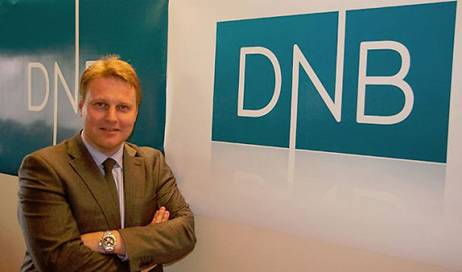
Communications Director Trond Bentestuen of DnB Nor showcases the new logo. The logo costs around one million euro.
Norwegian Snøhetta Architects have designed the large bank's new logo. Now the bank to will use around 20 million euros to change profile.
In November, the bank will change its name from DnB Nor to only DNB.
The management of DnB Nor group decided last year to collect and facilitate the company's brand. The name should be cut in half, and the Norwegian Post Bank and Vital insurance to be placed under the new name.
- Bookmark :
- Digg
- del.icio.us
- Stumbleupon
- Redit it
Good article about the LT media, but very soft…
- Posted by - (0) Comment
![]()

· Good article about LT media...
· but very soft approach....
· afraid they will hurt you when you write the real truth....??
· it is one of this reasons this country never will be on a western level.....
· it s corrupt till its bone's..... takes minimum 3 generation's to get some change.....
· wishing you well...
Jan Willem van Otterlo,
The Netherlands
- Bookmark :
- Digg
- del.icio.us
- Stumbleupon
- Redit it
![]()

Lithuania received bids from Westinghouse Electric Corp. and Japan’s Hitachi-GE Nuclear Energy Ltd. to build a nuclear power plant after shutting the Soviet-era Ignalina facility at the end of 2009.
The government will select the winning bidder this summer as it seeks to replace Ignalina, which the European Union ordered to be closed because of its similar design to the Chernobyl reactor that exploded in 1986, the Vilnius-based Energy Ministry said in an e-mailed statement today.
The Baltic nation plans to open a new plant in Visaginas in 2020 as Germany aims to close its units there. Lithuanian support for nuclear energy has remained high after the Ignalina closure pushed up energy costs and increased dependence on Russian energy. Lithuania imports almost 50 percent of its power. Russian gas monopoly OAO Gazprom supplies all of its gas.
“This project has a strategic significance across the whole Baltic Region,” Westinghouse, the U.S.-based nuclear reactor builder owned by Toshiba Corp., said in an e-mailed statement today.
Westinghouse offered AP1000 reactor technology with a proposed capacity of 1,154 megawatts in output along with “a strong commercial proposal,” it said without elaborating.
German Chancellor Angel Merkel called on May 30 for the closure of 17 nuclear reactors by 2022 in light of the partial meltdown of Tokyo Electric Power Co.’s Fukushima Dai-Ichi plant in Japan.
“For Lithuania and the whole region it is important to have independent capacity to generate electricity,” Prime Minister Andrius Kubilius told a news conference today. “Different countries have different solutions to these issues.”
Read more at:
http://www.bloomberg.com/news/2011-06-01/hitachi-ge-westinghouse-bid-to-build-lithuania-s-nuclear-plant.html
- Bookmark :
- Digg
- del.icio.us
- Stumbleupon
- Redit it
VilNews e-magazine is published in Vilnius, Lithuania. Editor-in-Chief: Mr. Aage Myhre. Inquires to the editors: editor@VilNews.com.
Code of Ethics: See Section 2 – about VilNews. VilNews is not responsible for content on external links/web pages.
HOW TO ADVERTISE IN VILNEWS.
All content is copyrighted © 2011. UAB ‘VilNews’.

 Click on the buttons to open and read each of VilNews' 18 sub-sections
Click on the buttons to open and read each of VilNews' 18 sub-sections 

















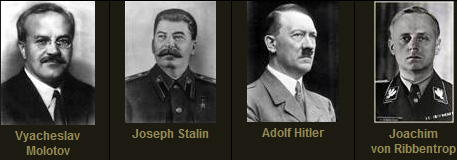









.jpg)



